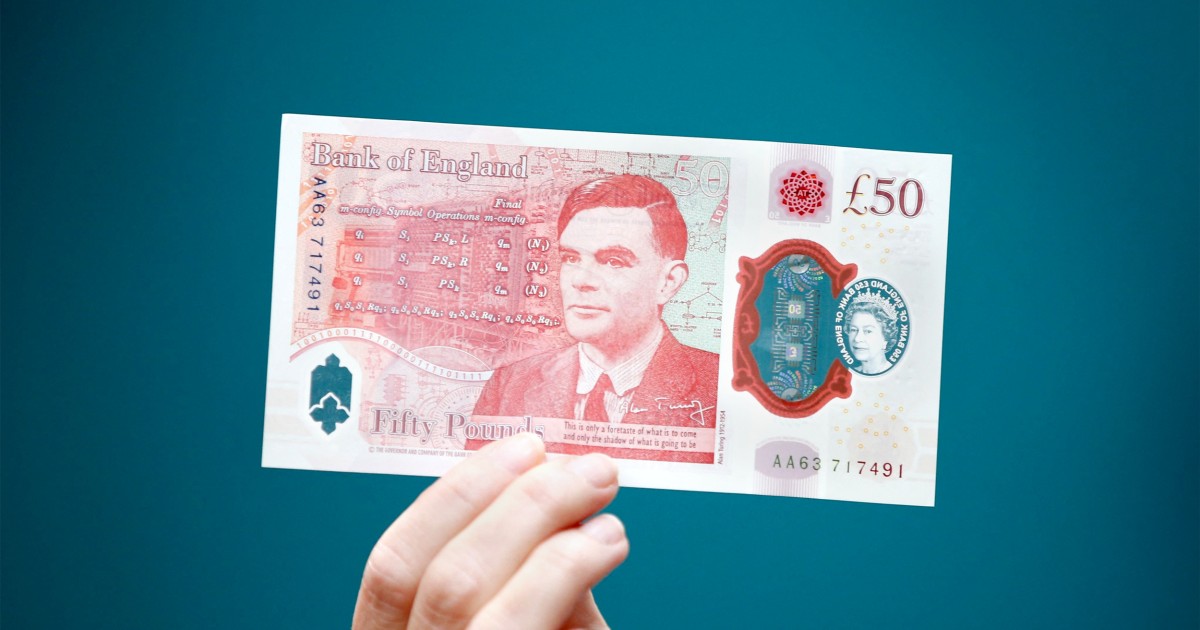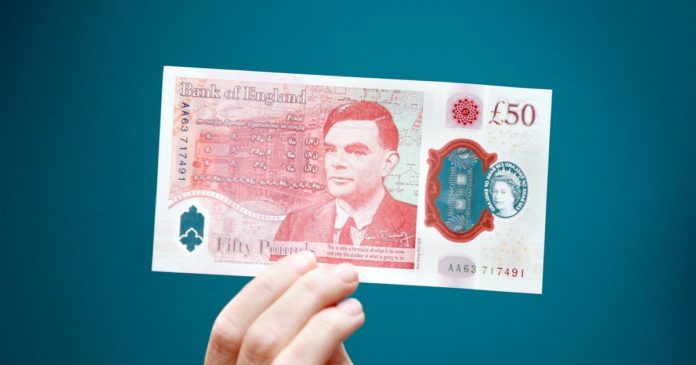
The Bank of England began circulating its new £50 bank notes featuring World War II codebreaker Alan Turing on Wednesday, which would have been the pioneering math genius’ 109th birthday.
Often referred to as the “father of computer science and artificial intelligence,” Turing was hailed a war hero and granted an honor by King George VI at the end of the war for helping to defeat the Nazis. Despite this, however, he died as a disgraced “criminal” — simply for being a gay man.
“I’m delighted that Alan Turing features on our new £50 bank note. He was a brilliant scientist whose thinking still shapes our lives today,” Sarah John, Bank of England’s chief cashier, told NBC News. “However, his many contributions to society were still not enough to spare him the appalling treatment to which he was subjected simply because he was gay. By placing him on this new £50, we are celebrating his life and his achievements, of which we should all be very proud.”
Born in London on June 23, 1912, Turing graduated from the University of Cambridge in 1934. At the start of WWII, he joined the British government’s wartime operation, designing a code-breaking machine known as “Bombe.” Bombe went on to supply the Allied Forces with significant military intelligence, processing, at its peak, 89,000 coded messages per day.
At the end of the war, Turing was made an Officer of the Most Excellent Order of the British Empire, an honor granted by the royal family to a selected few for their contribution to science, arts and public service.
In the years that followed, Turing carried on working as a computer scientist. His design for the Automatic Computing Engine, or ACE, would have been the first and most advanced computer for his time. But his colleagues at the National Physical Laboratory feared the engineering was too complex and decided to build a much smaller pilot ACE instead. Their competitors at Manchester University consequently won the race, and the disheartened Turing had joined their forces as deputy director. Turing also wrote the first programming manual.
“What we really don’t realize is how this moment and Turing’s vision changed the entire world. Before this, literally nobody in the world had imagined that a single machine could apply countless strings of abstract symbols. Now we know them as programs,” according to David Leslie of the Alan Turing Institute.
But being an outstanding computer scientist and a war hero didn’t spare Turing from what some have called a “witch hunt” of gay and bisexual men in the U.K., which led to the imprisonment of thousands of gay men and those suspected of being gay throughout the 1950s.
In January 1952, Turing was prosecuted for indecency over his relationship with another man in Manchester. Despite being referred to as a “national asset” during this trial by character witness Hugh Alexander, the head of cryptanalysis at the Government Communications Headquarter, Turing was persecuted.
In March of that year, Turing pleaded guilty and, to avoid imprisonment, had to agree to be chemically castrated by taking a hormonal treatment designed to suppress his libido.
His criminal record disqualified him from working for a governmental intelligence agency. Disgraced and disenfranchised, he took his own life by cyanide poisoning June 8, 1954, in his home in Manchester. He was 41.
Homosexuality was decriminalized in the U.K. more than a decade later June 14, 1967.
Despite his tragic end, Turing’s legacy as a wartime hero and the father of computer science has lived on, and the British government has attempted to right its past wrongs. In 2009, more than a half century after Turing’s death, then-British Prime Minister Gordon Brown, speaking on behalf of the government, publicly apologized for Turing’s “utterly unfair” treatment. In 2013, Queen Elizabeth II granted Turing a royal pardon.
Featuring him on a £50 bank note marks another milestone. This is the first time that a gay man is featured on a British bank note. It has been welcomed by parts of the LGBTQ community as a symbol of the country facing up to its dark past of the horrific persecution of gay men.
This visionary computer and artificial intelligence pioneer, once criminalized and disgraced, is now widely celebrated. In Turing’s own words from 1949: “This is only a foretaste of what is to come, and only the shadow of what is going to be.”







